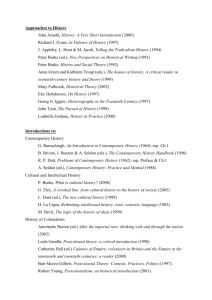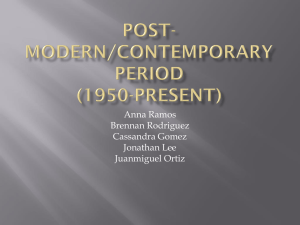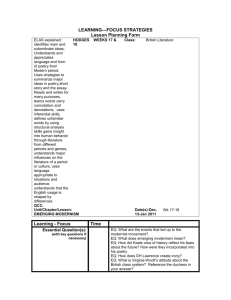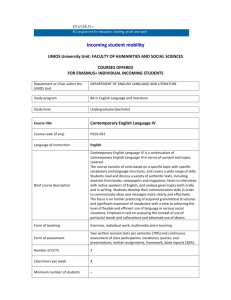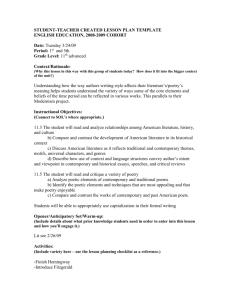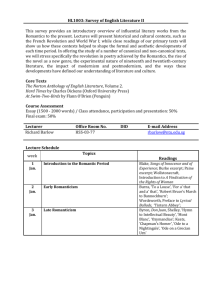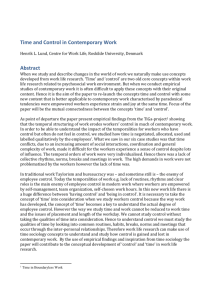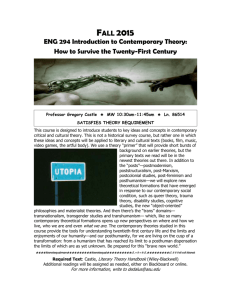MA in English: SDCC - University of Sussex
advertisement
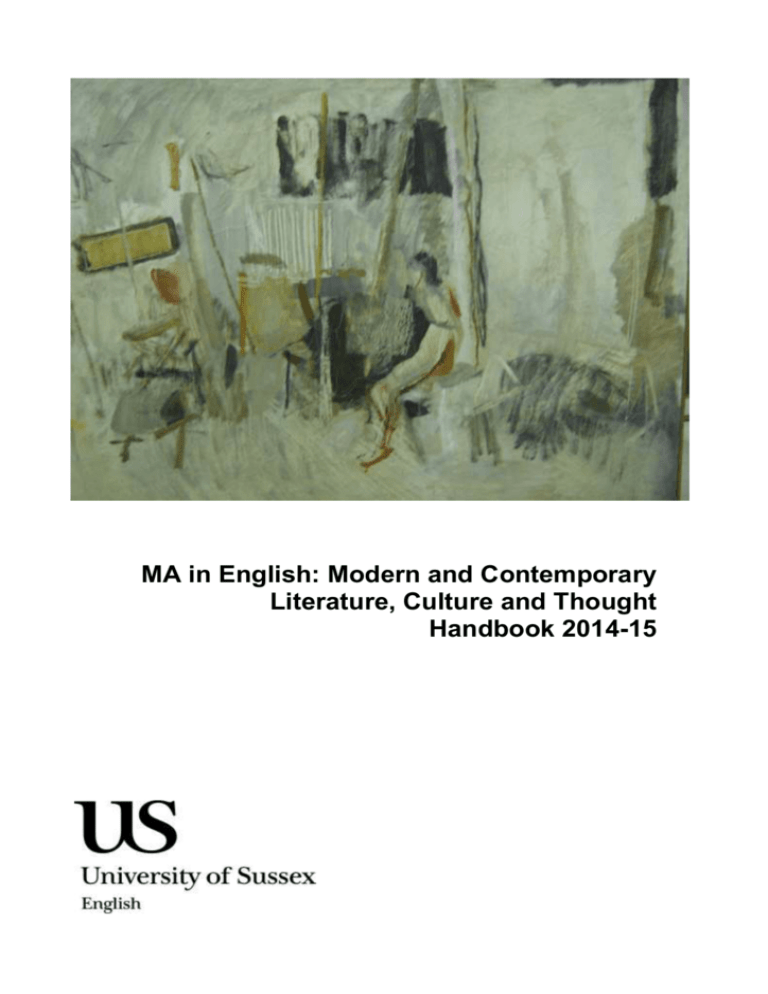
MA in English: Modern and Contemporary Literature, Culture and Thought Handbook 2014-15 Cover Image: Artist’s Studio. Canvas and Paper ( unknown ) This handbook refers to the MA course in Modern and Contemporary Literature, Culture and Thought offered by the English Department at the University of Sussex. The convenor of this course is Dr Pam Thurschwell (email: p.thurschwell@sussex.ac.uk). 2 1. Introduction The MA in Modern and Contemporary Literature, Culture and Thought at Sussex is a diverse course, which offers modules on a range of topics that analyse the production and reception of modern literature. The course, at various points, has included modules which reflect on the experience of the city, on photography, on modernism and postmodernism, on literature and philosophy, on psychoanalysis and sexualities, on the impact of war and on globalisation, and on many other issues, as part of an attempt to understand how literature (British, European and North American) has shaped and been shaped by its cultural, historical and intellectual contexts. There are modules on poetry, on drama, and on various kinds of prose, with a range of options exploring modernist fiction (including the work of Virginia Woolf and James Joyce) and contemporary writing. It is also possible to take modules from other related courses, including Creative and Critical Writing, Sexual Dissidence In Literature and Culture, Literature, Film and Visual Culture, Nineteenth-Century Literature and Culture, and Critical Theory, and these options enable students to situate the study of modern literature in a wider cultural and disciplinary context. There is also a thriving Centre for Modernist Studies at Sussex, which invites distinguished speakers from around the world, as well as regular colloquia in English, in Philosophy, in American Studies and Social and Political Thought. The range of modules on offer, the international excellence of faculty and students, and the intellectual energy of the graduate culture more generally are what makes the study of modern literature at Sussex uniquely dynamic and exciting. The MA is run from within the School of English. 2. Course structure and specifications For full-time students the course comprises four 12 week modules, two in the Autumn and two in the Spring, followed by the preparation and writing of a dissertation under supervision during the Summer Term and vacation. Modules are normally taught by a 2-hour weekly seminar. Each module attracts 30 credits and the Dissertation 60 credits: the total number of credits constituting the course is thus 180. Each module is examined by a 5,000-word term paper, to be submitted at the beginning of the term following that in which the module is taught. The dissertation length is 15,000 words and it is submitted at the start of September. Details on how to prepare, present and submit term papers and dissertations are given in the Examination and Assessment handbook and information sessions are also arranged by the Director of Doctoral Studies. For part-time students, the same requirements are spread over two years, with one module taken in each of the successive Autumn and Spring terms, and with the preparation and writing of the dissertation extended over two summer periods. There are a number of colloquia and other extra-curricular activities that students on the Modern and Contemporary Literature, Culture and Thought course are invited to attend. These include the English Graduate Colloquium, events organised by the Centre for Modernist Studies, The Sussex Centre for the Visual, the Centre for Critical and Creative Writing, and the Queory seminar, which is run fortnightly in the Spring and Summer terms. 3 The course modules for 2014-15 are as follows: Autumn Term Critical Issues in Queer Theory – Dr Rachel O’Connell Modernist/Postmodernist Fiction – Dr Pam Thurschwell ImagiNation – Dr Maria Lauret International Modernisms – Dr Natalia Cecire Pornography and Colonialism – Prof Marcus Wood The Novel and History – Dr Martin Ryle Literature in the Institution – Dr Sam Solomon Spring Term Gender, Sexuality and the Postcolonial – Dr Denise de Caires Narain Theory in Practice – Dr Doug Haynes Voices in the Archives: Writing from History – Dr Bethan Stevens Versions of Realism: Art, Film, Literature, Theory – Dr Alice Gavin Summer Term Dissertation 3. Course learning outcomes A student who has completed the MA in Modern and Contemporary Literature, Culture and Thought successfully will have: demonstrated a specialised knowledge of selected key issues in the field of modern literature; demonstrated a detailed knowledge of one or more leading topics in modern literature; demonstrated oral and writing skills in which a clear, concise and exact use of language is brought to bear on a rigorous consideration of texts, ideas and controversies within the field; demonstrated an ability to understand and to use, when necessary, the specialist vocabularies associated with literary and cultural studies, and with studies in modern literature; evaluated and critiqued existing theories in the field; cited relevant materials judiciously, and to good effect, in the construction of an overarching argument; read ‘literary’, ‘historical’ and ‘theoretical’ texts critically and attentively; demonstrated skill in time and work management, including the ability to read, write and research independently used electronic resources; put together well-written, fully-referenced word-processed essays; carried out a substantial and original piece of research within the field. 4 4. Course modules Autumn Term: Critical Issues in Queer Theory This module provides a critical framework for addressing some of the most compelling issues facing queer studies and contemporary culture today by examining queer theory both as a mode of analysis and as a political praxis for potential radical social change. Unlike its lesbian/gay studies counterpart, often concerned with the politics of sexual difference alone, queer theory operates as a critical lens for (re)reading the complexity of the cultural worlds we inhabit while exposing and critiquing heteronormativity as it is imbricated within a range of social norms, categories, and institutions, including, but not limited to, the body, the family, gender, censorship, racial and national fantasy, reproductive politics, and health care in addition to sexuality. How might queer theory, with its investment in the endless proliferation of social differences, enable new understandings of subjectivity, child development and maturation, gender, race, history, imperialism, postcolonial nationalism, and citizenship? Primary theoretical texts will be read alongside contemporary cultural texts, where appropriate, including literature, film, visual art, clinical texts, and legal documents in order to demonstrate the approaches and contingencies of queer theoretical work. Modernist and Postmodernist Fiction This module will explore the terms modernism and postmodernism, and the relationship between the two, by reading a range of novels which engage with issues of artistic form, subjectivity, and modernity. We'll ask a variety of questions including: How has the 20th and 21st century novel represented the attempt to delineate the shape of individual lives through 'portraits'? What changes to the novel's terrain have been effected by contemporary history, war, or historical trauma? How useful is the term postmodernism for describing contemporary writing? How have high and mass cultural forms, such as visual art, the cinema, the web, etc. influenced contemporary writing? How do recent novels portray the aesthetic? What different ideas of temporality do we find in modernist and postmodernist writing? What versions of borrowing from the past do we find in modernism and postmodernism and what purposes do these borrowings serve? Is there what the critic Andreas Huyssen has called a 'great divide' between modernism and postmodernism? What continuities might we find between modernism and postmodernism (if those terms are still useful)? Authors read will include Henry James, Joseph Conrad, Gertrude Stein, Virginia Woolf, Don DeLillo, J.M. Coetzee, Jennnifer Egan and Ali Smith. Spring Term: The Novel and History The module explores recent and contemporary novels written in English that represent and interpret historical experience. It requires students to consider both substantive and formal aspects of the selected works. The theme of how the novel as a form can represent, mediate and interpret historical experience is addressed in a variety of contexts, which illustrate some of the diverse traditions, projects and audiences with which English-language fiction is engaged today. We will consider novels written in Britain, in the USA, and in postcolonial settings. Writers studied may vary from year to year depending on the interests and expertise of tutors and lecturers. In the initial year of the module, they will include Pat Barker, Kazuo Ishiguro, John McGahern, Toni Morrison, Don DeLillo, Ngugi wa Thiong'o, Jean Rhys and Salman Rushdie. The primary focus of lectures will be on the texts studied, and in seminar discussion students will be expected to comment in detail on chapters, episodes, and passages selected by themselves and by the tutor. The module will also raise and consider larger questions of fictional form and genre, especially as these relate to the ways in which novels may be read as quasi-historical 5 narratives. The end-of-module essay will require students to write a comparative critical study of two novels studied, considering in particular how they can be read as representations of history. Gender, Sexuality and the Postcolonial Feminist notions of 'a global sisterhood' were powerfully challenged in the 1980s by black and/or lesbian feminists (amongst others) who exposed the heteronormative, culture and class-specific assumptions of mainstream feminism and questioned whether all women were subject to patriarchy in identical ways. At roughly the same time, postcolonial studies began to establish itself as a distinct field within literary and cultural disciplines. The impact of gender on postcolonial studies was belated but there is now a growing body of work that seeks to define postcolonial feminism(s) and to revisit, if not revive, ideas of a transnational or global feminist solidarity. This module explores some of the key debates within this highly contested field focusing on a selection of key postcolonial texts (Fanon, Said, Bhabha) and on feminist theoretical interventions (Spivak, Mohanty, Lazreg, Boyce Davies, Boehmer, Kaplan, Ahmed, Alexander amongst many others). Alongside theoretical material, the module focuses on a range of literary texts by contemporary postcolonial writers from a wide range of postcolonial locations (including Africa, South Asia, the Caribbean, the South Pacific and the Middle East) and postcolonial diasporas. The module also engages with the shift away from an emphasis on 'women' towards 'gender' as a more productive way of interrogating constructions of both femininity and masculinity. The selected writers include: Jamaica Kincaid (Antigua/USA), Assia Djebar (Algeria/France), Zoe Wicomb (South Africa/Scotland), Mahasweta Devi (India), Sia Figiel (Samoa), Patricia Grace (New Zealand), Edwidge Danticat (Haiti/USA), Adhaf Soueif (Egypt/UK) and Erna Brodber (Jamaica), JM Coetzee, Nadine Gordimer (South Africa), VS Naipaul (Trinidad/UK), Nurrudin Farah (Somalia), Yvonne Vera (Zimbabwe). Some of the issues and topics covered include: reading and representing 'the other woman'; representations of 'the' nation; language; class; home and belonging; motherhood; sexuality; orality; intertextuality; heteronormativity; migration. (And more!) The Migrant Writer This module explores the displacement of the writing subject within the historical context of postcolonial migration. Central concepts in literary and cultural criticism are debated, including: hybridity and dialogical discourse; mimicry and the migrant subject; homelessness and the creation of new cartographies; and diasporic and non-originary histories. `To write is to travel', according to Iain Chambers; the module will use this idea to explore the displacement of the writing subject within the historical context postcolonial migration. The work of key immigrant writers will be analysed in relation to central concepts in literary and cultural criticism: hybridity and dialogical discourse, the development of `border languages', mimicry and the migrant subject, homelessness and the creation of new cartographies, and diasporic and nonoriginary histories. In the process the centrality of migration, exile and displacement to a range of critical and theoretical approaches will be highlighted. Modernism 1910-1945 This module will explore the achievements and limits of English modernism through a detailed examination of the work of two of its principal writers, T.S.Eliot and Virginia Woolf. Eliot's contributions as a poet, essayist and dramatist were key to the revolution in the theory and practice of modern poetry while Woolf's contributions as a novelist and essayist were key to the revolution and practice of the modern novel. The module will explore the similarities and differences in their treatment of mind and consciousness, their views of and treatment of history, their representation of the city, their attitudes to questions of sexuality and gender, their notions of nation and of national identity, their responses to new mass cultural technologies from the popular press to photography, radio and the cinema, and their responses to the key events of the period in which they lived, including the First and the Second World Wars, the Spanish Civil War and the rise of fascism. The module will be organised chronologically and thematically and will enable students to follow personal as well as intellectual associations between Eliot and Woolf and between Eliot, Woolf and their modernist contemporaries. The module will in particular reflect on the ways in which Woolf responded as a writer to Eliot's work and Eliot as a writer responded to Woolf's work. 6 Theory in Practice: Readings in Contemporary Theory and Literature Rather than offer a survey of Anglo-American criticism and theory, this module seeks, through a number of case studies, to address those critical paradigms that have proved significant in the post-war period. The case studies are organised around a narrative that concerns the ‘dematerialisation of the sign’ - a journey towards postmodernity - and includes attempts to recover alternative political models in the face of this. 5. Teaching and learning Depending on where you were an undergraduate, you may find that you have either fewer or more teaching hours as an MA student than you did when you were studying for your BA. Full-time students will normally be doing two modules at any one time: each of these will involve a weekly seminar of two hours. All module tutors have weekly office hours that you are expected to use to ask for more targeted advice, or clarifications about module requirements and structures. You are also strongly encouraged to attend relevant open seminars that are brought to your attention. In addition, you should spend about 30 hours a week in individual study. The University and the School of English provide certain facilities and resources – most notably, a library, the use of computers, and a space where learning is constantly pursued. Your tutors will direct your study with reading lists and all kinds of informal advice. Your ideas and conclusions will be put to the test in seminars, where you will be expected to have reached some views of your own and to be able to argue for them. Your written work will be formally assessed to determine your degree result, and you will receive feedback on your term papers as you go along. We will help you as much as we can, but what you get out of your study will depend on how much you put into it: your mastery of the subject is primarily something for you to achieve. Though the structures we put in place will assist you in this endeavour, they cannot do the work for you. Individual Study The largest, and in many ways the most important, part of your working time will be spent on your own, or discussing problems with your fellow-students. It is important to organise your time effectively, and to plan your use of the library, especially if you have to do paid work as well as your academic work. A word of advice: always set yourself specific and realistic targets when you work, and take regular breaks. Set yourself to read a particular article or chapter of a book, or to work for a pre-determined length of time (say one and a half hours) and then pause when you have completed this task. A few periods of intense concentration, separated by short breaks, will serve you far better than any amount of time spent sitting at a desk but not really concentrating. Module seminars The focus of your work for each module will be a weekly seminar. You should be in command of the reading set, and be prepared to try out your own ideas and to defend them in discussion. Module seminars are compulsory. In many seminars, some form of presentation will also be required: your tutor will give you guidance on the form which presentations are expected to take and how to prepare them. Essays We require that your essays be professionally presented: typed or word-processed, with full scholarly references and a bibliography. Pay particular attention to matters of spelling, style and punctuation. Poor punctuation is one of the commonest failings in student essays, even at graduate level. If you are unsure about correct punctuation, get hold of a guide: there are several cheap and readable such guides on the market. 7 As a general guideline, a well-presented professional essay will be the result of (at least) three drafts. A first exploratory one in which you set down your ideas and support them with relevant evidence; a second one which goes over the first draft and reorganises paragraphs, expands sentences where needed, or cuts out repetitive chunks; and a third one, which should really be only a proofreading draft, to clear out spelling and/or punctuation mistakes, spot the repetition of the sentence you cut and pasted too many times, or insert the verb/article/preposition you accidentally removed when cutting and pasting. Module Evaluation Student evaluation forms are issued at the end of each module and are scrutinised by the tutors associated with the module before it is taught again. These forms are anonymous, and are an opportunity for you to tell us what you felt about all aspects of the module, including the material covered, teaching methods, and the adequacy of library and web resources. We take your comments and suggestions for improvement very seriously. We do not, of course, guarantee to be able to meet all student requests, first because we have to operate within tight financial constraints, and second because we have to exercise our own academic judgement about the desirability of any change. In addition, some key areas – notably the library – are beyond the immediate control of the School of English. But we do guarantee to give active consideration to all serious suggestions for change and improvement. Student Support Information about student support is available from the Student Life Centre on 01273 876767, email studentlifecentre@sussex.ac.uk . 6. Assessment Criteria Band Percentage Variation Qualities Distinction 70-100% 80-100% Truly exceptional work that could be published with little or no further development or alteration on the strength of its original contribution to the field, its flawless or compelling prose, its uncommon brilliance in argument and its demonstration of considerable knowledge of the topics and authors treated on the module. 70-80% Merit 60-69% Outstanding work that might be fit for publication or for development into a publishable article. Work that is exceptional for its originality of conception and argument, its conduct of analysis and description, its use of research and its demonstration of knowledge of the field and of the core materials studied on the module. Good or very good work that is thoughtfully structured or designed, persuasively written and argued, based on convincing use of research and fairly original in at least some of its conclusions. 8 Pass 50-59% Fail 0-49% Satisfactory work that meets the requirements of the module and sets out a plausible argument based on some reading and research but that may also include errors, poor writing, or some unargued and improbable judgments. 35-49% Work that is inadequate with respect to its Unsatisfactory argument, its use and presentation of research and its demonstration of knowledge of the topics and authors treated on the module, or that is poorly written and difficult to follow or understand. 15-34% Very unsatisfactory Work that plainly does not meet the requirements of the course and that fails to make any persuasive use of research or to conduct any argument with clarity or purpose. 0-15% Unacceptable or not submitted. 6. Teaching faculty and associates The following brief profiles show you the nature of the teaching and research interests of those associated with the MA in Modern and Contemporary Literature, Culture and Thought, though not all will be teaching on the course in the current year. You can find fuller details of tutors’ interests and publications at their individual staff profiles on the Sussex website: use the staff search at http://www.sussex.ac.uk/people. Although not all of these tutors are offering a module in the current academic year, most of them will be available for MA dissertation supervision in the Summer Term. Peter Boxall researches modernist fiction and drama; aesthetics and cultural politics, particularly in the work of Samuel Beckett; contemporary literature, especially the work of Don DeLillo; the utopian function in twentieth-century writing. Natalia Cecire specializes in American literature since 1880 and the theory of minor knowledges. Her research interests include history of science, poetics, gender and sexuality, childhood, media, and visual culture. Sam Cooper researches modernist and contemporary literature and culture; the avant-gardes, historical and neo; critical and aesthetic theory; literary influence and Anglo-Franco correspondence; visual culture; the Situationist International; British countercultures and the 1960s. Sara Crangle researches on the intersections between high modernist writers--Hardy, Joyce, Stein, Woolf, Beckett--and philosophical thought. She is also interested in contemporary poetry, poetics, the modernist "tradition," bathos, and everyday emotional states. She is completing a book entitled Prosaic Desires: Modernist Knowing, Laughter, Boredom, and Waiting. Alistair Davies researches British modernism and postmodernism; 20th-century British literature; European and British film, film and literature. Denise De Caires-Narain has research interests in postcolonial writing generally and in Caribbean and Caribbean diaspora writing and culture in particular. She has published widely on 9 Caribbean women’s writing, focusing on the work of Jean Rhys, Jamaica Kincaid, Erna Brodber and Shani Mootoo, among others. She is interested in the gendered implications of current debates about orality, sexuality and popular culture in the Caribbean and in the ongoing contestation over the relevance of the categories ‘postcolonial’, ‘feminist’ and ‘queer’ within the region. She is currently working on a book-project on contemporary postcolonial women’s writing, provisionally titled, Strange Intimacies: Representing the Servant in Postcolonial Women’s Texts. Alice Gavin’s research interests include twentieth-century literature, film and visual culture, and critical theory. Her first monograph, Literature and Film, Dispositioned (2014), explores literature's encounter with silent cinema with recourse to theories of free indirect style both literary and filmic. Doug Haynes researches American and European modernist, postmodernist and avant-garde writing and culture, reading it alongside Critical Theory, or the work of thinkers from Marx through to Theodor Adorno. In fact, his focus is on writers and artists who seem themselves to straddle or anticipate this kind of aesthetic-theoretical axis and who are in some way transgressive, excessive or hilarious. He is, for example, currently publishing a series of articles on Thomas Pynchon, reviewing this most postmodern of writers through the lens of leftist thought. Daniel Kane’s interests focus primarily on modern and contemporary American poetry, and avantgarde writing, film and culture more generally. I have written extensively on poets affiliated with the New York Schools. Maria Lauret is a life-writer and scholar interested in the American literature of non-dominant groups, such as women, African Americans and immigrants. Her academic work explores how the intersection of race, ethnicity, gender, class and sexuality affects writing and reading, and consistently asks how aesthetics and politics (gender and genre, race and representation, migration and imagination) relate to each other in the work of so-called minorities. Vicky Lebeau researches psychoanalysis and modern culture; nineteenth- and twentieth-century fiction; theories of childhood and democracy; literature and visual culture; feminism and theories of social identity, and contemporary film and literature. Rachel O’Connell started teaching at Sussex in January 2012. She studied for her PhD in the Department of English Literature at New York University, where she also taught literature and writing; she also has an MSc in Gender Studies from London School of Economics. She specialises in Victorian literature, especially the fin de siecle, and also in queer, gender, and disability studies. She teaches primarily critical theory and LBGT/queer studies. Nicholas Royle researches modern literature and literary theory, especially deconstruction and psychoanalysis; the uncanny; creative writing Martin Ryle researches in the areas of travel writing, Irish literature and culture, and nineteenthand twentieth-century literature. Minoli Salgado's research has a regional connection to South Asia, a literary focus on postmodernist texts, and a theoretical orientation towards post-structuralist debates on migration. She is especially interested in exploring the literary construction of migrant subjectivity, and in comparing the ways in which different forms of displacement affect the representation of place and time. This has led her to write and teach on Salman Rushdie and Michael Ondaatje, exploring in the process some of the links between complexity theory and diasporic writing. She is currently writing a monograph on Sri Lankan literature in relation to the civil war due to be published by Routledge. Sam Solomon’s teaching and research are broadly in twentieth century and contemporary literature (poetry and cross-genre writing especially) as they relate to radical social movements; he has written on the connections of gay and women's liberation to political economy, particularly in 10 the context of Marxist-feminist praxis. Research and teaching interests include: creative writing, feminism, Marxism, contemporary poetics, cross-genre and documentary writing, queer theory, critical university studies, Yiddish literature and culture, literary translation, aesthetics and politics. Keston Sutherland researches contemporary and twentieth century English and American poetry, Marxism and Frankfurt School critical theory, phenomenology and philology, poetics, the history of aesthetics. Jenny Taylor researches in the areas of nineteenth-century literature, psychology and the history of science, and in literary and cultural theories. Pam Thurschwell has worked on the intersection of psychoanalysis, new technologies and the supernatural at the end of the 19th century and the beginning of . She has published on Henry James, George Eliot, early 20th century typewriters, Bob Dylan, Jonathan Coe, Daniel Clowes and Elvis Costello amongst other topics. Her current book project is on adolescence and anachronism. Norman Vance’s interests include Victorian and Irish literature, religion and society, and biblical and classical influences on English literature. Author of The Victorians and Ancient Rome (1997) and Irish Literature since 1800 (2002), among other works, he could be described as mainly a literary historian. His most recent project, on Narrative Authority and the Death of God, explores connections between the perceived loss of Biblical authority and the development of Victorian and post-Victorian fiction in an increasingly secular society. 11
